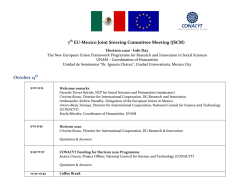
Revista de Administración Pública - Instituto de Investigaciones
Esta revista forma parte del acervo de la Biblioteca Jurídica Virtual del Instituto de Investigaciones Jurídicas de la UNAM www.juridicas.unam.mx http://biblio.juridicas.unam.mx Álvaro Canseco Olivera Políticas públicas de pensiones en México 249 Revista de Administración Pública Alonso Reyes, María. Políticas públicas de pensiones en México para las personas sin capacidad de ahorro. México, Instituto Nacional de Administración Pública, 2012. First place of the 36th INAP Awards. Álvaro Canseco Olivera The book entitled “Pension public policies for people without abilities to save in Mexico” is the result of the thesis to obtain a doctorate in Political and Social Sciences with primary focus on Public Administration; it deals with pensions and their relation to public policies. The author addresses in a critical fashion the implementation of public policies regarding social security in a neoliberal economic context which wishes to maximize profits and leaves most of society unprotected because they are unable to access these services which the government has to provide for. The author tries to find a way to formulate axes to reconstruct social security and includes a comparative analysis of the two social security pension approaches: micro-pensions and universal pensions. The author states that these two models are different ways of facing social risks: individually and collectively. Proposing that pension-wise it is more efficient to think about universal non-contributive models and not targeted and contributive ones. The author’s main hypothesis is that the neoliberal model, which is the theoretical framework of social security public policies, will force the State to intervene in an unfair way to solve these problems in the future; this will cost a fortune if preventive measures are not implemented. This hypothesis examines the public policies from the neoliberal approach in a concrete and critical way; especially those policies derived from the Washington Consensus. Also stating that values such as solidarity, fairness and justice must be taken into account in pension systems. On the other hand, it tries to deal with the existing dichotomy between universalization DR © 2013. Instituto Nacional de Administración Pública, A. C. Esta revista forma parte del acervo de la Biblioteca Jurídica Virtual del Instituto de Investigaciones Jurídicas de la UNAM www.juridicas.unam.mx http://biblio.juridicas.unam.mx 250 Revista de Administración Pública Volumen XLVIII, No. 1 and targeting of public services and debates on the effectiveness of these two models. On the other hand, we can find the natural disasters theory as an approach that tries to explain the risks of social security; thus, trying to explain how they could affect the formulation of public policies regarding pensions in Mexico. We also are shown how the social security system is structured and the main changes it has suffered over the years. This theoretical analysis is strengthened with a statistical data analysis methodology that includes several demographic, economic and social variables that help us understand how pension public policies in Mexico do not have the necessary scope to satisfy the needs of the entire population when they reach old age. This analysis helps us understand the problem of not having a solid pensions system for a population that needs this service. On the other hand, it introduces the situation of people that do not have the ability to save money and that are ignored by the public pension system and that also do not have the possibility of accessing private pensions. This statistical study’s goal was to determine the number of people in Mexico that do not have the ability to save money and take care of contingencies. The idea is that a new model should take on a different option than the one proposed by neoliberalism; all of the interested sectors should participate more decisively, especially when talking about pensions. One of the central points of this investigation is the presentation of a pension system; the author calls it micro-pension and universal pension. She presents the feasibility of implementing these proposals in order to mitigate the marginalization suffered by the old-age population which can barely aspire to minimum conditions of survival. This research also socializes knowledge, allowing people who are not familiar with technical and specific pension terms to understand the text. It also presents an outline that supports the understanding of the pensions system. Perhaps the most complicated section for people which are not familiar with the topic is the one that presents actuarial models of pensions and life insurance and universal pension costs; these models are presented in the appendix in great detail. After analyzing these models, micro-pensions and universal pensions, their strengths and weaknesses and although they cannot be compared directly –because they belong to different actuarial and financial models– they are two ways of understanding and addressing the same social problem. DR © 2013. Instituto Nacional de Administración Pública, A. C. Esta revista forma parte del acervo de la Biblioteca Jurídica Virtual del Instituto de Investigaciones Jurídicas de la UNAM www.juridicas.unam.mx http://biblio.juridicas.unam.mx Álvaro Canseco Olivera Políticas públicas de pensiones en México 251 The author reaches the conclusion that universal pensions provide more advantages; the first problem has to do with the lack of income during old age and establishes a minimum amount of resources for all of the population which will be the first pillar of income for old-age people. This promotes the generation of secure and healthy population; it decreases extreme poverty levels in old-age people and increases the value of oldage people in society. Pensions is a topic of general interest, this is why this book is extremely important, for it is a service that must provide by the State. The scholars that study this government topic will be greatly benefited by this book because it presents the current situation of the pensions system in Mexico. The information included is the result of extensive bibliographic research and was awarded the first prize of the 36th INAP Awards. DR © 2013. Instituto Nacional de Administración Pública, A. C.
© Copyright 2026





